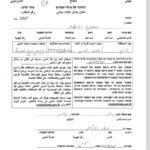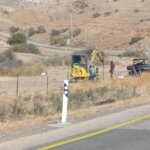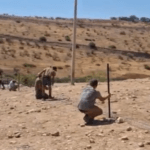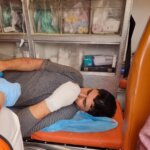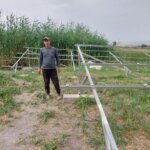#StopWaterApartheid Right to Water campaign launched
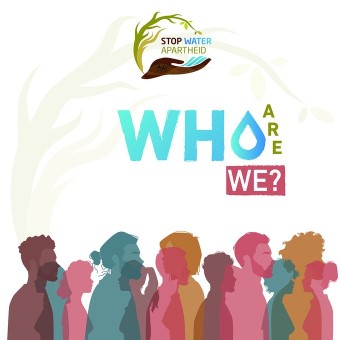
The ‘Right to Water’ campaign was designed by 15 young activists mainly from the Northern Jordan Valley and Masafer Yatta in Area C.
The campaign aims to target both national and international stakeholders and duty bearers online and offline, to challenge Israeli policies and practices that violate their fundamental right to water. Tactics will include lobby meetings with diplomatic missions, PA institutions and awareness-raising with international audiences in third party countries.
The Land Defense Coalition (LDC) and 7amleh – The Arab Center for the Advancement of Social Media mobilized young activists from targeted communities in Area C, who enrolled in a training programme on advocacy and land rights (e.g. land registration mechanisms, legal protection, HR violations documentation, advocacy and digital campaigning).
Follow the campaign on Facebook at Stop-Water-Apartheid, on Twitter at @s_aparthied and on Instagram at StopWaterApartheid.
The problem
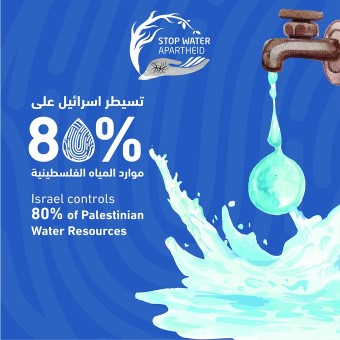
Israel controls 80 percent of Palestinian water resources and Israeli settlers use approximately six times the amount of water used by the 2.6 million Palestinians in the West Bank. Most settlements are located close to water resources, which Palestinians are restricted from accessing. Israeli settlers in the Jordan Valley use large quantities of water to grow agricultural produce for export, while Palestinian farmers struggle to irrigate their crops.
Palestinian communities are at risk of becoming isolated enclaves. The de facto annexation of the fertile land of the Jordan Valley in particular, the food basket of the West Bank, would render a functioning Palestinian State impossible, depriving it of the land and natural resources necessary to sustain itself.
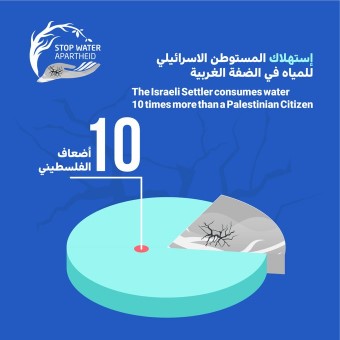
Already today, in the midst of the COVID-19 pandemic, Palestinians in Area C are increasingly struggling to stay on their lands. According to OCHA, 389 Palestinian-owned structures in the West Bank were demolished or confiscated in the period between March 2020 and August 2020, which counts as the highest average destruction rate in four years. This left 442 Palestinians homeless, further exposing many to risks associated with the pandemic. In August 2021 alone, 205 people were displaced, more than in any other single month since January 2017.
Jordan Valley Access to Water Resources: The Jordan Valley, of which 81% is classified as Area C, occupies a strategic position in the Palestinian context. It comprises over a fifth of the territory of the West Bank and contains vital land reserves for the natural expansion of Palestinian towns and cities. It has abundant water resources – including one-third of the underground water reserves in the West Bank – and has vast potential for agricultural, industrial and tourism industries. The economic development of the Jordan Valley is considered essential for Palestinian growth and recovery and is therefore crucial for the sustainability and viability of an independent Palestinian State.
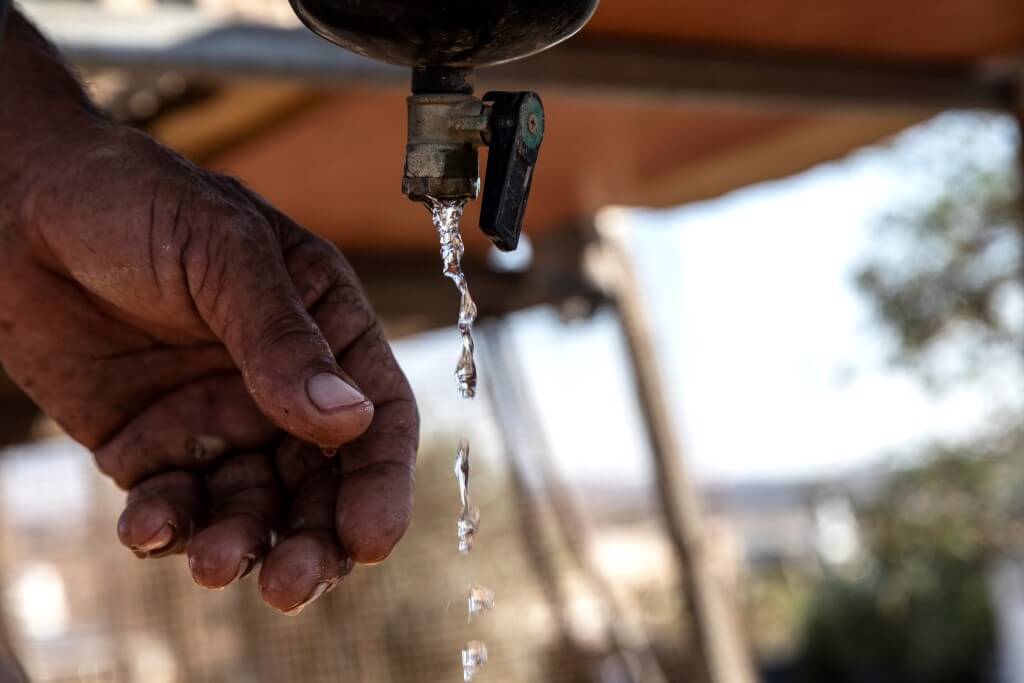
Despite the abundance of water resources in Area C and the Jordan Valley, these areas suffer from acute water shortage due to the Israeli occupation policies to control water resources. Since 1967, the Israeli military occupation authorities have been imposing complete power over all water resources, and have been appropriating Palestinian land for the establishment and expansion of Israeli settlements in the area. The International Humanitarian law states that due to Israel`s occupying power status in the OPT, Israel has obligations regarding the right to water towards the protected civilians (Palestinians). The Hague Regulations place restrictions on an occupying power’s use of private and public property, including the natural resources of the occupied territory. Article 43 of the Hague Regulations9 imposes two obligations on an occupying power: to restore and ensure, as far as possible, public order and safety in the occupied territory, and to respect, unless absolutely prevented, the laws in force in the occupied territory. However, Israel has adopted a number of measures through which it can illegally exercise sovereign rights over Palestinian water resources. Thus, Israel has exerted considerable military and political efforts (1) to gain, maintain and consolidate exclusive access to Palestinian water resources, (2) to appropriate water resources for the sole benefit of Israelis, including settlers, and (3) to paralyze Palestinian water infrastructure development in the occupied Palestinian territories, aimed at forcibly transferring Palestinian communities. As such, these policies and practices have laid the foundations and underpin the three principal pillars of Israel’s ‘water-apartheid’.
Comparing water consumption: Both absolutely and proportionately, Israelis use a far greater amount of the region’s total water resources. According to official Palestinian figures, Israeli settlers in the West Bank consume 10 times more water on average than the territory’s Palestinian residents. This violates Article 11(1) of the International Covenant on Economic, Social, and Cultural Rights (ICESCR), to which Israel is a state party, “the States Parties to the present Covenant recognize the right of everyone to an adequate standard of living for himself and his family, including adequate food, clothing, and housing, and to the continuous improvement of living conditions.” The Committee reaffirmed its position in 2002, in a General Comment devoted specifically to the right to water, in which it asserted that the human right to water is essential for living a dignified life. Currently, West Bank Palestinians consume around 70 liters of water per capita per day, although the World Health Organization (WHO) states that a normal person requires a minimum daily water allotment of between 100 and 120 liters, to maintain the most basic standard of living. In Israel, however, daily per capita water consumption stands at some 300 liters, while Israeli illegal settlers in the West Bank consume as much as 600 liters per day. Settlements benefit from enough water to run farms and orchards, and for swimming pools and spas, while Palestinians often struggle to access the minimum water requirements. Moreover, the Palestinian population has doubled since the signing of the Oslo Accords in 1993, and the amount of water available in the West Bank — roughly 110 million cubic meters of water per year — still remains at 1995 levels. According to the accords, “the Palestinians’ water quota should have reached 200 million cubic meters by the year 2000.”
Why campaign for the Right to Water?
- The man-made water crisis impacts every aspect of Palestinian life in Area C, such as agriculture, economics, livestock raising and the environment.
- The right to water is the most fundamental basic human right. Palestinians are denied access to this right by the Israeli apartheid regime.
- Severe lack of water in Area C as a result of the Israeli apartheid policies threatens Palestinians existence, resilience and forces them to leave their lands and houses.
Why campaign for the Right to Water?
- The man-made water crisis impacts every aspect of Palestinian life in Area C, such as agriculture, economics, livestock raising and the environment.
- The right to water is the most fundamental basic human right. Palestinians are denied access to this right by the Israeli apartheid regime.
- Severe lack of water in Area C as a result of the Israeli
apartheid policies threatens Palestinians existence, resilience and forces
them to leave their lands and houses.
Theory of change
Mainstream Water apartheid by amplifying Palestinian youth voices exposing Israeli related human rights violations in the Jordan valley will lead to international pressure to end harassment, impunity of settlers protected by the Israeli Occupation Forces, and Israeli water discriminatory policies aiming to displace Palestinians in the area.
Specific Campaign Objectives:
- Exposing (water) right violations in Area C (specifically in the Jordan Valley and Southern Hebron Hills) and the constant threats residents of these areas are exposed to on a daily basis.
- Explaining water apartheid, used by the Israeli occupation forces as a tool for displacement and its connectivity to theft of resources (water, agricultural land, minerals) through settlement expansions and acquiring territory by force in violation of international law.
- Advocating for the residents of Area C, to have access to the amount of water needed in accordance with international water law (water equity).
- Raising awareness among (new) international audiences and networks on the fundamental issue of water in Area C, as well as in the broader Palestinian context.
- Presenting concrete actions governments can take to fulfil Palestinian water rights and bringing an immediate end to Israeli water theft.

